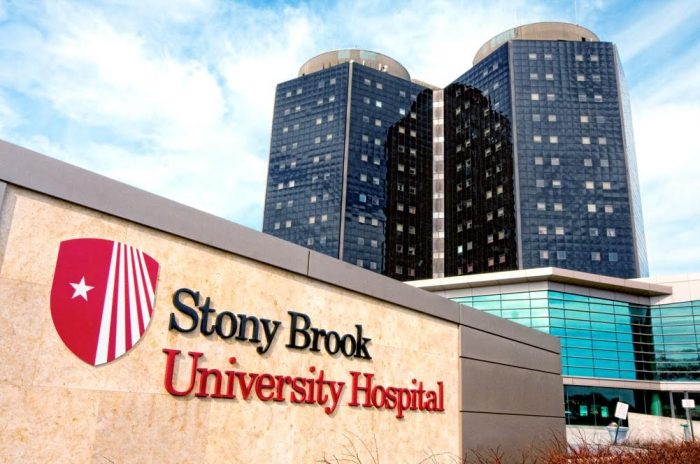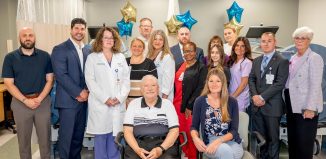Stony Brook Medicine team performs life-saving surgery on a Long Island coach before championship game
Stony Brook Medicine team performed a life-saving surgery on a Long Island football coach just a few days before the championship game to take place on Saturday, November 20.
Kyle Moodt, 38, a Bellport High School Varsity Assistant Football Coach, 5th grade general education teacher, father, and husband, battled debilitating headaches daily since July 2021. He and his wife Michelle have three children ages 3 (Emma), 5 (Brody) and 7 (Kayla), and live in Center Moriches.
The chronic headaches were isolated in one area, the front right side of his head. Kyle said “they were constant from wake up to bedtime. I’ve had two back surgeries in the past and I would probably take that sciatica pain over the headaches. The headaches never went away. It was hard to function with a headache all day long. Took a lot of Tylenol. At times, I would have to lay down whether I had practice or even in school. It was affecting my teaching in the classroom. I was teaching more from my desk than I have in most of my years. When I went home, after work, I was very tired. I felt like I wasn’t able to contribute to the household as much and more fell on my wife’s shoulders.”
Shortly after Kyle saw Stony Brook Medicine doctors, the medical team quickly identified that these were not normal headaches from reading a computed tomography (CT) and a computed tomography angiogram (CTA) scan. David Fiorella, MD, PhD, Neurointerventional Radiologist; Director, Stony Brook Cerebrovascular Center; and Co-Director, Stony Brook Cerebrovascular and Comprehensive Stroke Center and Michael Guido, MD, Neurologist; Director, Stony Brook Neurology Stroke Program; and Co-Director, Stony Brook Cerebrovascular and Comprehensive Stroke Center determined Kyle had a life-threatening malformation of the arteries in his brain. The diagnosis was arteriovenous fistula, or DAVF. This dangerous increased pressure in his head was a risk for fragile veins bursting which would cause a life-threatening brain bleed.
On November 11, Dr. Fiorella was able to use an angiogram to map out the malformation and make a treatment plan to allow him to be at the football team’s playoff game. And, subsequently treated Kyle’s complex brain malformation on November 16 through a small puncture site in his right wrist, performing a minimally invasive surgery that took less than one hour. The special procedure Kyle had was embolization of a dural fistual with a material Onyx. The goal of the procedure is to block off the abnormal arteries while preserving the normal arteries and veins.
Kyle is ecstatic. “Dr. Fiorella said I’m going to get this taken care of and I feel great 24 hours later after the successful surgery. It’s amazing. I don’t have brain fog. Had a good night’s sleep. I slept through the night. Woke up without a headache. I haven’t taken any medicine or Tylenol in 24 hours. The headaches that I’ve had for months are not there. Luckily, we were able to get to the bottom of this.”
“His angiogram showed the cure after the treatment and his MRI and MRA of his blood vessels indicated his brain is completely normal. He is neurologically perfect,” said Dr. Fiorella.
Kyle is grateful for Dr. Fiorella’s expertise and quality of care received at Stony Brook University Hospital. “About a year ago, he performed surgery on my father who had a stroke. I was very happy to know I was going to him for care. I remember, he put me, my mom, my brother, my sister at ease, talking and dealing with my father’s illness. So, if he’s confident, then I’m confident. And, they set the standards pretty high at Stony Brook.”
This positive outcome couldn’t be more timely as Kyle will not miss the opportunity to coach the offensive and defensive line as his Bellport Clippers face off against the Lindenhurst Bulldogs for the DII Suffolk County Championship at Stony Brook University’s Kenneth P. LaValle Stadium on Saturday at 7pm. Bellport last won a Suffolk title in 2010.
In sharing what it means for Stony Brook doctors to urgently treat Kyle with very little recovery time needed and getting him back to his “two families” touches him on a very emotional level. “Football is a passion of mine, but my main goal is the three kids I have at home. Definitely, I wanted to make sure that I would be able to make it to the game as the team gets ready for one of the biggest moments in their life but more importantly, family and my well-being came first. But the football team is family too. Some of these kids I’ve known since fifth grade. Some I played with their fathers or uncles as an offensive lineman for three years between 1998 and 2000. My parents are still very involved. Football brings the community together. We have all walks of races and socioeconomic backgrounds. My wife will cook for the lineman dinners at my house with 10 to 15 kids. We’re building a community and camaraderie between the team and this leads to our success. Kids care about each other. As coaches, we care about them too on and off the field. It’s why I love the district and where I am. It’s a big family affair.”







